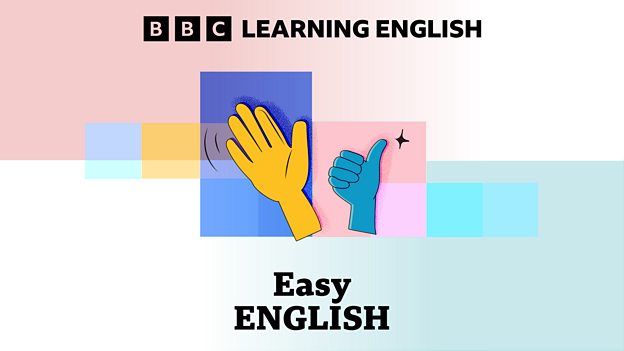6 Minute English
Intermediate level
How do babies communicate?
Episode 250619 / 19 Jun 2025

_____________________________________________________________________________________________________
Download a free 6 Minute English worksheet and transcript!
Try our free interactive quiz!
______________________________________________________________________________________________________
Try more episodes of 6 Minute English:
- Can climate change affect our mental health?
- How important is politeness?
- What's your favourite kind of noodle?
______________________________________________________________________________________________________
Introduction
How do babies manage to let their parents know what they want, when they haven't yet learnt to speak? Is there a reason behind their seemingly random movements? Neil and Beth discuss this and teach you some new vocabulary.
This week's question
Which of the following statements about newborn babies is true?
a) babies are born with a full set of teeth
b) babies' eyes change colour
c) babies have the same number of bones as an adult
Listen to the programme to hear the answer.
Vocabulary
one hundred percent
used to emphasise that you agree completely with something, or that it is completely right or wrong
jerky
quick and sudden; stopping and starting, rather than smooth-flowing
intentional
planned; done on purpose
to the naked eye
as seen without specialist instruments or specialist knowledge
love at first sight
(idiom) experience of starting to love someone as soon as you see them for the first time
unhelpful cliché
overused phrase or comment (cliché) which has the effect of creating negative or unrealistic attitudes
TRANSCRIPT
Note: This is not a word-for-word transcript.
Neil
Hello. This is 6 Minute English from BBC Learning English. I'm Neil.
Beth
And I'm Beth. As an adult, when I need to tell somebody something, I just open my mouth and speak. Neil, I'm hungry.
Neil
Ahh, you'd better get something to eat then. And when I want something, it's the same – I just ask. Erm, can you pass me that pen, please Beth?
Beth
There you go! So that’s now, but as babies, we’re not able to speak – we can only communicate with our bodies or by crying. We can’t clothe, feed or wash ourselves – we rely on others totally for our survival.
Neil
We've all been one, but how do newborn babies tell Mum and Dad what's going on before they can speak? That's what we'll be investigating in this episode, along with some useful new vocabulary, all of which you can find on our website, bbclearningenglish.com.
Beth
Baby communication is a topic child psychotherapist Marie Derome writes about in her new book, What Your Baby Wants You to Know. So, what do newborn babies want us to know? Well, here's Marie's answer:
Marie Derome
I think they want us to know that they need us one hundred percent, because without us, they won't survive.
Neil
Without someone caring for them, babies wouldn't survive, so on a basic level every baby is saying, "Take care of me!" Marie says babies need us one hundred percent. She uses the phrase one hundred percent to emphasise that what she said is completely true.
Beth
And we'll hear more soon, but first I have a question for you, Neil. Although they look small and helpless, babies are born with some amazing abilities. So, which of the following statements about newborn babies is true:
a) babies are born with a full set of teeth,
b) babies' eyes change colour, or
c) babies have the same number of bones as an adult?
Neil
Ooh, that's an interesting question. I think I know the answer, though. I'm going to go with b) babies' eyes change colour.
Beth
OK. Well, we'll find out if that's right at the end of the programme. Now, if you've spent time with a baby, you've probably noticed how much they move their little arms and legs. Here, Marie Derome explains the meaning of these movements to BBC Radio 4 programme, Woman's Hour.
Marie Derome
75% of their movements are intentional, synchronised. They're not jerky – you know, to the naked eye they appear very jerky, but they're not. They're there to bring us in – the parents – you know, they need us… so all those movements are there to say, "Look! Come! Look at me. I need you. I want to, you know, to play with you."
Neil
Babies move their arms and legs to create a bond with their parents. To the naked eye, these movements look jerky – an adjective meaning sudden and quick, not smooth-flowing. The phrase to the naked eye means in a way that can be seen without special instruments, like a microscope, or is seen in the way an ordinary person would.
Beth
In reality, these jerky movements are intentional, meaning that they are planned and done for a particular purpose – to catch their parents' attention so they will be noticed and cared for.
Neil
Marie's book is aimed at new parents who are learning to understand their baby's body language, but she also has advice for parents who are finding it difficult to bond with their newborn, as she explains here to BBC Radio 4 programme, Woman's Hour.
Marie Derome
Parenting is really hard. Falling in love with this little baby is not… you know, this idea of love at first sight – I think it's such an unhelpful cliché. It will take time to love that baby, to get to know that baby…
Beth
Many new parents dream about falling in love with their baby at first sight. The idiom love at first sight means being in love with someone as soon as you see them for the first time.
Neil
But Marie thinks this ideal dream can cause problems. She calls it an unhelpful cliche. A cliche is an overused phrase or comment that has been said so much that it's become unoriginal and uninteresting, and in some cases unhelpful – for example by creating unrealistic expectations, or by making parents feel guilty they are not doing enough.
Beth
Marie says it takes time to get to know a newborn baby and to fall in love. But for most parents, all the misunderstandings, sleepless nights and dirty nappies are worth it for their amazing baby.
Neil
And speaking of amazing babies, what was the correct answer to your question, Beth?
Beth
Well, the correct statement was that babies' eyes change colour. I think you got that right, Neil.
Neil
I did! It's an amazing fact, but apparently true.
Beth
Yes, indeed. OK. So, let's recap the vocabulary we've learnt in this episode, starting with the phrase one hundred percent, which can be used to emphasise that you completely agree with something, or that you consider something to be completely right or wrong.
Neil
If you describe a movement as jerky, you mean it moves suddenly in stops and starts, rather than flowing smoothly.
Beth
The adjective intentional means planned and purposeful.
Neil
The phrase to the naked eye means in a way that can be seen without special instruments, or to someone without special knowledge.
Beth
The idiom love at first sight describes the experience of starting to love someone as soon as you see them for the first time.
Neil
And finally, an unhelpful cliche is an overused phrase or comment – a cliché – which has the effect of creating unhelpful or unrealistic attitudes. Once again, our six minutes are up, but remember you can find many more episodes, plus a quiz and worksheet for this one, on our website, bbclearningenglish.com. Goodbye for now!
Beth
Bye!
Latest 6 Minute English

How can we help wild bees?
Episode 250717 / 17 Jul 2025
Did you know that many species of wild bees are endangered in the UK? What can we do to help?

Do you need to declutter your home?
Episode 250710 / 10 Jul 2025
Is your home neat and tidy? Or is it full of stuff you no longer need? You might need to declutter!

How do you say sorry?
Episode 250703 / 03 Jul 2025
Different cultures apologise in different ways. How do people say sorry where you are from?

Are plant-based substitutes healthier than meat?
Episode 250626 / 26 Jun 2025
Processed meat has been shown to be bad for our health, but are plant-based meat substitutes any healthier?

How do babies communicate?
Episode 250619 / 19 Jun 2025
What does it mean when newborn babies wave their arms and legs about?

Can climate change affect our mental health?
Episode 250612 / 12 Jun 2025
Is your mental health being affected by climate change?

How important is politeness?
Episode 250605 / 05 Jun 2025
How would you greet somebody you didn't know?

What's your favourite kind of noodle?
Episode 250529 / 29 May 2025
How much do you know about noodles?


Which cooking oil is the best?
Episode 250515 / 15 May 2025
Are some cooking oils better for your health than others?

Should animals be kept in zoos?
Episode 250508 / 08 May 2025
Are zoos an important scientific resource, or an unnecessary abuse of animal rights?

Can cows prevent wildfires?
Episode 250501 / 01 May 2025
How are cows helping to prevent wildfires in Spain?

How climate change affects animal migration
Episode 250424 / 24 Apr 2025
How is climate change affecting animal migration?

Can AI solve crime?
Episode 250417 / 17 Apr 2025
Could artificial intelligence be used to solve a murder?


Are we getting more allergic to things?
Episode 250403 / 03 Apr 2025
Do you know anyone who has 50+ allergies?

Can we boost the immune system?
Episode 250327 / 27 Mar 2025
Can ginger shots, turmeric and cold water swimming boost your immune system?


Should we eat less rice?
Episode 250313 / 13 Mar 2025
Is it possible to grow rice in a more eco-friendly way?



Young women on social media
Episode 250220 / 20 Feb 2025
How do women in different countries experience the online world?

Rage bait: How online anger makes money
Episode 250213 / 13 Feb 2025
How do people make money from rage bait?



How the world learned to love fast food
Episode 250123 / 23 Jan 2025
How did fast food spread around the world?

Which country has the best schools?
Episode 250116 / 16 Jan 2025
How do you compare education systems?

Eating 50-year-old stew
Episode 250109 / 09 Jan 2025
Would you eat a stew that's been in a pot for 50 years?

Are you drinking enough water?
Episode 250102 / 02 Jan 2025
How much water do you drink every day? Is it enough?







